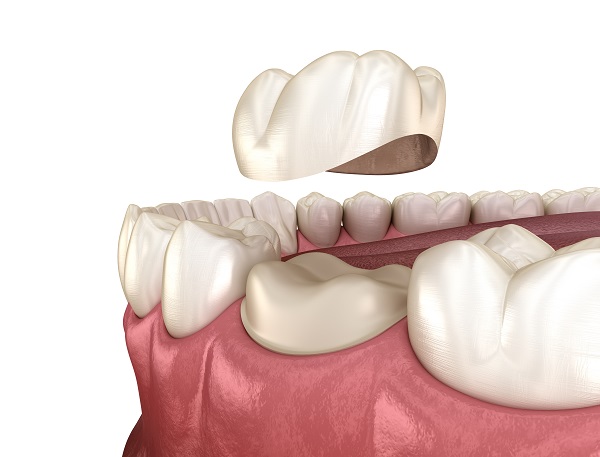Dental crowns are to thank for restoring teeth that are in bad shape. However, once they are placed, it is up to the patient to ensure that the crown does its job.
There are a few things that dentists recommend once a dental crown has been placed. These recommendations can be extremely helpful when trying to make the most out of the restoration. Ready to learn more?
Making dental crowns last
The following information should be reviewed when trying to extend the life of a dental crown.
Avoid hard, sticky and chewy foods
There are certain foods that should be avoided in order to extend the lifespan of a dental crown. Candies that are sticky or extremely chewy such as taffy or gum can do severe damage to a dental crown. Additionally, eating meats that are chewy or that have bones in them can loosen the dental crowns, which could ultimately result in a broken or even lost crown. While it can be tempting to eat certain foods, it is best to avoid them to ensure that the dental crown remains intact/
Avoid biting anything that is not edible
A great way to extend the life of a dental crown is to simply avoid putting unedible items in the mouth. While it sounds easier said than done, some people have a pretty bad habit of biting on their fingernails or opening bottles with their teeth. Dentists highly recommend avoiding using the teeth for anything unedible. Dental crowns are strong and durable, but when used for anything other than chewing, they can break and cause a severe amount of pain.
Visit the dentist regularly
Visiting the dentist on a regular basis ensures that any warning signs are dealt with early on. Dentists typically have a better eye for problems within the mouth. If they spot a red flag that could indicate an issue with a dental crown, they can fix it before it becomes worse.
Practice good oral hygiene
One of the best ways to extend the life of a dental crown is to practice good oral hygiene on a daily basis. Oral hygiene can help avoid a lot of problems, including a damaged broken crown. Brushing after every meal or at least twice a day helps to ensure the health of the teeth, including the ones that are capped by crowns. Additionally, flossing at least once a day helps to remove any unwanted debris in between teeth. When debris is left in between teeth, especially ones with dental crowns, there is a more of a chance that damage will occur. The crown may become loose or even broken.
Learn more today!
Dental crowns can significantly improve oral health and appearance, however, they have to last in order to do so. Further tips and recommendations for extending a dental crown's life should be addressed by a dentist. Reach out today to learn more.
Request an appointment here: https://www.biancodentistry.com or call Dental Health Associates, PC at (503) 862-3270 for an appointment in our Portland office.
Check out what others are saying about our dental services on Yelp: Dental Crowns and Dental Bridges in Portland, OR.
Related Posts
How Dental Crowns Are Used as a Dental Restoration
Dental crowns are one of the versatile restorations used in dentistry. Crowns are used to save damaged teeth that cannot be saved using less invasive procedures. Damage can occur to teeth …
The FAQ's of Gold Dental Crowns
Gold dental crowns are a type of restoration that sits over the entirety of a severely decayed or damaged tooth. The purpose of these restorations is to provide much-needed support and protection …
Will I Need a Dental Crown After a Root Canal?
Dental crowns are a great restoration option used both on their own and in conjunction with other procedures such as root canals and dental implant placements. They are often recommended after a root …
What is a Dental Crown?
Dental Crowns are a popular restoration option used by general dentists. Restorations are often needed when teeth are in bad shape, as they help bring the tooth back to life, thus encouraging good oral health. …

